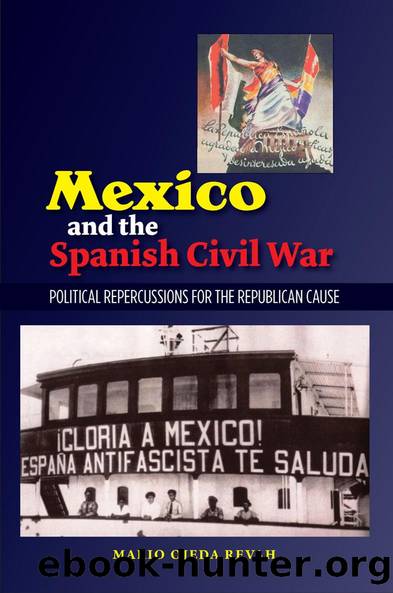Mexico and the Spanish Civil War by Mario Ojeda Revah

Author:Mario Ojeda Revah [Revah, Mario Ojeda]
Language: eng
Format: epub
ISBN: 9781845197728
Google: UM-rjwEACAAJ
Publisher: Sussex Academic Press
Published: 2015-01-15T02:49:13+00:00
OPPOSITE ENGAGEMENTS: ANDRÃS IDUARTE AND CARLOS PEREYRA
Two Mexican intellectuals, Andrés Iduarte and Carlos Pereyra, both resident in Spain before and during the war, offer incomparable illustrations of these antithetical allegiances assumed by numerous Mexicans along the dividing line created by the war.
Iduarte arrived in Spain in 1933 as a student and a correspondent of El Nacional. He rapidly engaged in political activities and came in contact with sundry Spanish socialist politicians and trade unionists. During the war, Iduarte contributed as radio anchor for the propaganda broadcasts of the Ministry of State. There, Iduarte befriended Anselmo Carretero, an official at the Ministry of State, who invited him to collaborate with him.
Under direct instructions from NegrÃn, Iduarte outlined a Republican-sponsored propaganda broadsheet to make the American public aware of the âfairnessâ of both the Mexican oil expropriation and the Spanish peopleâs âresistance against the foreign powers that had violated its soil.â 30 It would have been published in New York, had the Republic not collapsed. Iduarte complemented his propagandist activities in Antonio Machadoâs magazine Hora de España, where he regularly contributed with articles promoting of the Republican cause.
Conversely, Carlos Pereyra, naturalized as a Spanish citizen since 1915, became a prominent figure of the Francoist establishment. Pereyra had served as Foreign Under-Secretary during Victoriano Huertaâs dictatorship. After Huertaâs downfall, he became an expatriate in Spain. There he gained celebrity as an historian, specializing in the Spanish Conquest of Mexico and in the Colonial era. Pereyra spent the duration of the war in Madrid, writing articles for El Universal, with no reference to current events, but about Spanish Imperial past, which made him highly suspect of having pro-Nationalist sympathies. The Mexican Embassy, under Pérez Treviño, offered him sanctuary in order to spare him from reprisals by disorderly militias, protection which he refused, even though he burnt several manuscripts for fear that the militias might use them against him.
After the Civil War, Pereyra became a prominent member of the Consejo de la Hispanidad. In that capacity, he wrote several pamphlets denouncing Rooseveltâs âGood Neighbourâ policy as a âsinister plotâ to undertake a surreptitious penetration of Spanish America. In 1940, Pereyra published El Panamericanismo en el momento actual where he vitriolically denounced Pan-Americanism as an âinsidiousâ scheme to alienate Ibero-American nations from their âmother countryâ and complete their domination by the United States.31 Together with Rodolfo Reyes, General Millán Astray, the rector of the University of Madrid, PÃo Zabala y Lera, and Francoâs first Minister of Education, José Ibáñez MartÃn, Pereyra contributed to a series of broadcasts for the newly formed Radio Nacional de España which transmitted a series of propagandist conferences to the American continent called Voces de la Hispanidad. His affected Hispanism brought him to write Mejico instead of Mexico.32 Until his death, Pereyra worked as an academic of the Francoist intelligentsia which appointed him to preside over the prestigious Instituto Gonzalo Fernández of Oviedo, devoted to the study of (Spanish) American History.33
These menâs divergent trajectories show the conflicting ways in which Mexicans placed
Download
This site does not store any files on its server. We only index and link to content provided by other sites. Please contact the content providers to delete copyright contents if any and email us, we'll remove relevant links or contents immediately.
| Africa | Americas |
| Arctic & Antarctica | Asia |
| Australia & Oceania | Europe |
| Middle East | Russia |
| United States | World |
| Ancient Civilizations | Military |
| Historical Study & Educational Resources |
Cat's cradle by Kurt Vonnegut(15334)
Pimp by Iceberg Slim(14484)
4 3 2 1: A Novel by Paul Auster(12372)
Underground: A Human History of the Worlds Beneath Our Feet by Will Hunt(12085)
The Radium Girls by Kate Moore(12017)
Wiseguy by Nicholas Pileggi(5769)
The Fire Next Time by James Baldwin(5431)
Perfect Rhythm by Jae(5398)
American History Stories, Volume III (Yesterday's Classics) by Pratt Mara L(5299)
Paper Towns by Green John(5177)
Pale Blue Dot by Carl Sagan(4996)
A Higher Loyalty: Truth, Lies, and Leadership by James Comey(4952)
The Mayflower and the Pilgrims' New World by Nathaniel Philbrick(4490)
The Doomsday Machine by Daniel Ellsberg(4484)
Killers of the Flower Moon: The Osage Murders and the Birth of the FBI by David Grann(4435)
The Sympathizer by Viet Thanh Nguyen(4384)
Too Much and Not the Mood by Durga Chew-Bose(4337)
The Borden Murders by Sarah Miller(4312)
Sticky Fingers by Joe Hagan(4188)
